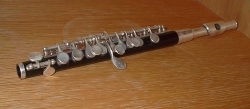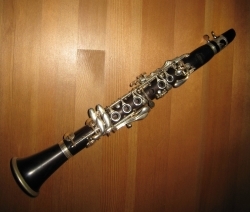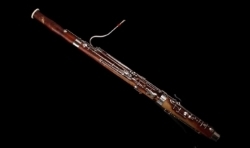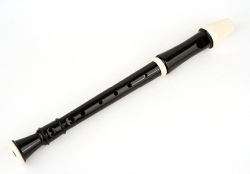
This latest in a series of articles on where in London to learn different types of instrument, among other things, focuses on those you blow down/through/into.
Woodwind instruments don’t get the fanfare of, say, brass, or the boring old guitar, but they deserve their place in any self-respecting orchestra. We’ve gathered together a few tutors and organisations that will show you the ways of the flute, bassoon and so on, and even the recorder if you’ve forgotten your school days.
Those listed are a few we’ve picked to whet your appetite but we don’t mean to suggest that these are the only places you can learn these instruments — far from it, as websites such as London Music Teachers and The Tutor Pages list many more. If you’ve had a good experience with a music teacher or you’d like to plug your own lessons please head down to the comments below the article.
Flute
The flute needs no introduction. Long, thin, play it sideways, you know the score. And happily for us, a dedicated Flute School exists at Swiss Cottage, run by Janna Hüneke and Kate Grace. Websites can’t be expected to be updated every day, unless they’re Londonist of course, but it’s particularly disappointing to find out we’ve missed ‘Flute Day’ by less than a month, which will make no sense when they do update the website, such is the transience of the internet.
At any rate, Flute School London run dedicated courses a couple of times a year so you’ll have to check their website for dates, ignoring that the site says they’re based in the wildlands of Tonbridge, which they’re not.
Piccolo
Is a piccolo just a tiny flute? Doubtless the 15 or so people who play the piccolo but hate the flute would say it’s very much an instrument in its own right. It’s half the size of a flute, it’s only manufactured in the key of C which presumably means it only plays one note, and perhaps its most famous outing is on Quintet for Piccolo and String Quartet by Graham Waterhouse, which we’ve never heard.
This slim and confusing biography could explain why there seem to be no tutors of the piccolo in London who do not first and foremost promote themselves as flute tutors. The best we can come up with are Violeta Johnson of Alexandra Park and Jenny Sutton of Surrey Quays, but if there’s anyone out there who specialises in the piccolo we’d be very keen to hear about it.
Oboe
There are many oboe tutors around London; it’s a very popular instrument, it transpires. A standard oboe is a wooden tube roughly 65cm long, with metal keys, a conical bore and flared bell. You blow at the double reeds in the mouthpiece, and out comes this. Lovely.
Islington Woodwind Practice is the name under which two of London’s oboe tutors ply their trade. Sally MacTaggart is studying for a Masters from the Guildhall School of Music and Drama and has led and assisted workshops and outreach projects throughout Tower Hamlets. Her colleague Guy Passey also trained at the Guildhall School, and performs with London folk-fusion band Tribe of Tinkers.
Cor anglais
The French have a horn of their own so its only right the English get one too. The cor anglais is a long, thin, oboe-like instrument, though its pear-shaped bell gives it a more covered timbre than the oboe, it says here. A little more keyboard work reveals that the cor anglais is featured in the Lionel Richie and Diana Ross version of Endless Love, and in Elton John's Can You Feel the Love Tonight.
Fine hits, we’re sure you’ll agree, and to develop your skills so you too can warble along to corny love songs we recommend Stella Jean Dickinson, because not only is she a winner of the Harold Craxton Chamber Music Prize and many other awards, she’s also a ‘cor anglais specialist’ based in Muswell Hill. Most others seem to focus almost exclusively on the oboe, forgetting all about the lowly cor anglais, so Stella Jean gets our vote for standing up for the little guy.
Bagpipes
From England to Scotland in a magnificent segue. The bagpipes are another instrument that tend to heighten emotions. On this one Londonist is very keen to take sides, as a set of bagpipes played well can be a truly glorious sound, swelling the chest with pride in mankind’s musical achievements regardless of how many times you’ve been to places with frightening names like Strathpeffer, Kirkintilloch and Largs.
Dr Richard Mackenzie, the self-styled London Bagpiper, may well be the man to show you the secrets of this splendid sack of sounds. We’re not quite sure where he’s based but given the name we’re pretty confident it’s not far from here. And if any of you need convincing that the bagpipes are for you, here’s a man named Peter playing them on Westminster Bridge.
Clarinet
Did you know that the clarinet was developed by a German named Johann Christoph Denner from an earlier instrument named the chalumeau? You did? Oh. Well, did you know that a person who plays any type of clarinet is called a clarinetist or clarinettist? You can choose how many Ts you include if you get in touch with Oleg Lapidus, who offers lessons in the long single-reed instrument from his base near Euston, at your own premises or even via webcam.
Apparently the clarinet's place in the jazz ensemble was usurped by the saxophone, of which more imminently...
Saxophone
Perhaps the most divisive instrument yet invented, the saxophone is named after its inventor, Adolphe Sax, a 19th century Belgian who decided his clarinet just wasn’t doing it for him any more. Some view the saxophone as a smooth, sultry tool enlivening some of the finest pieces of jazz ever written. Others hear Baker Street and immediately want to hurt and maim at will.
Londonist remains on the fence in such arguments but would certainly recommend Rusne Mikiskiate should you wish to emulate Tackleberry around the campfire in the first Police Academy movie. Rusne has been playing the sax since she was 11 years old and provides tutoring in the Marble Arch area.
Bassoon / Contrabassoon
Before you click the link in this section we must warn you that the page you will see involves a man named Tom Hardy talking about ‘tonguing’ (easy, ladies). Not safe for work, you might imagine, but in fact this Tom Hardy is a London-based bassoon and contrabassoon tutor who also muses on the best way to play these instruments. The further the tongue has to move the less chance you have of going fast, says Tom. Quite so.
For anyone wondering about the difference between the two instruments, the contrabassoon is a larger version of the bassoon and its sound is an octave lower. Also, the tonguing might be similar but the fingering is different. What?
Recorder
Around 98.6% of British schoolchildren were forced to play the recorder at school, which for some will have connected its reputation forever with snotty schoolboys passing their germs around via the one instrument shared by the entire class. Recorders are of course about much more than mucus; they produce a very clear, piercing sound that you will come to know and love well should you buy a £3 pink version for your offspring one regrettable Christmas.
To banish the unpleasant memories often associated with the recorder, a few lessons via the administration of Julie Dean mightn’t hurt. It’s unclear whether Julie herself takes lessons, though her name certainly surfaces countless times when searching for London-based recorder tutors and the information at Recorder Groups London seems to have come from her, for which she has our gratitude.
And to end, a child playing a recorder. Doesn’t he look like he’s enjoying himself?




